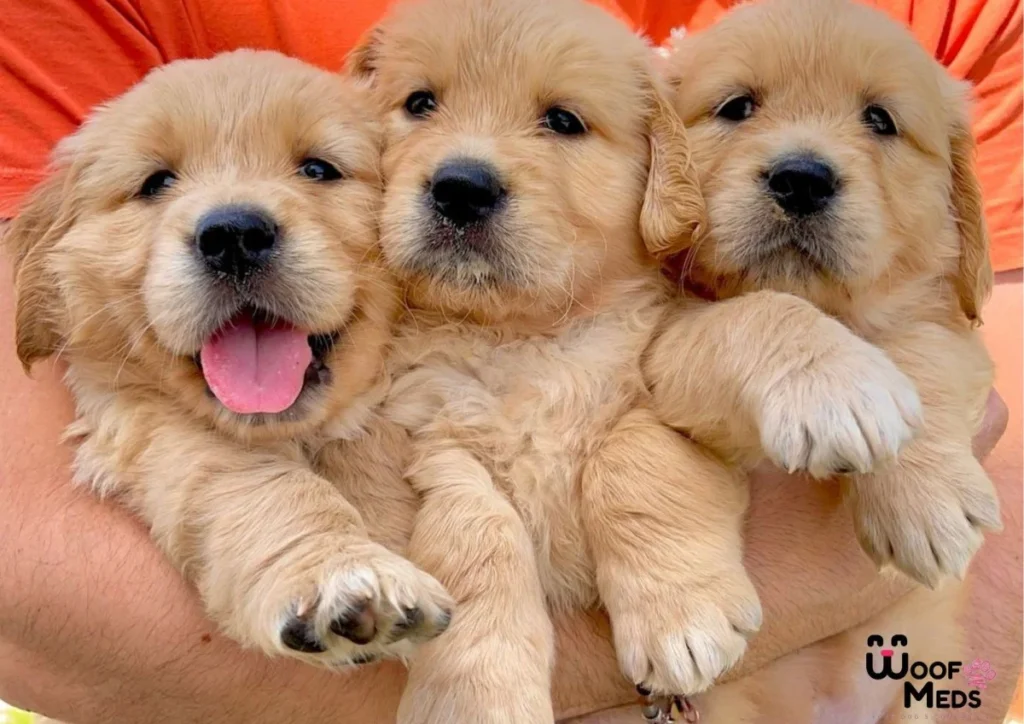Some of the most well-liked dog breeds in the world are golden retrievers, who are distinguished by their brilliant golden coats, amiable dispositions, and intelligence. For any dog lover, raising a Golden Retriever puppy can be among the most fulfilling experiences. Not only are these puppies gorgeous, but they also develop into loving, obedient, and adaptable friends. To guarantee that your Golden Retriever puppy grows up healthy and well-adjusted, you must, however, understand their unique demands and qualities when raising a puppy. Everything you need to know about raising a Golden Retriever puppy, from training and temperament to diet and health care, is covered in this extensive blog post.
Certainly! Here’s a table summarizing the breed characteristics of a Golden Retriever puppy:
| Characteristic | Description |
|---|---|
| Temperament | Friendly, sociable, intelligent, eager to please, loyal, affectionate, patient, and gentle. |
| Size | Medium to large. Males: 23–24 inches tall, 65–75 pounds; females: 21.5-22.5 inches tall, 55–65 pounds. |
| Coat | Dense, water-repellent double coat. outer coat is wavy or flat; undercoat is soft and thick. color ranges from light golden to dark golden. |
| Eyes and Expression | Dark brown eyes with black rims; friendly and alert expression. |
| Tail | Slight curve, covered with long, feathery fur; often wagged enthusiastically. |
| Energy Levels | High energy; requires regular exercise, including walks, play, and outdoor activities like swimming and fetch. |
| Exercise Needs | Daily exercise is essential; she enjoys outdoor activities and excels in agility, obedience trials, and other sports. |
| Trainability | Highly trainable, intelligent, and eager to please. Responds well to positive reinforcement. Suitable for roles as service dogs, therapy dogs, and search and rescue. |
| Socialization | Early socialization is important to develop confidence and good behavior around people, children, and other animals. |
| Common Health Issues | Prone to hip dysplasia, elbow dysplasia, cataracts, certain heart conditions, and cancers like hemangiosarcoma and lymphoma. |
| Lifespan | 10–12 years on average, with proper care. |
| Diet and Nutrition | It requires a balanced diet to maintain healthy weight. Portion control is important to prevent obesity. |
| Grooming Needs | Regular brushing (at least once a week) is necessary to prevent matting and control shedding. More frequent grooming during shedding seasons (spring and fall). |
| Shedding | Moderate to heavy shedding, especially during seasonal changes. |
Golden Retriever’s Temperament
Due to their well-known friendliness and tolerance, golden retrievers make wonderful family companions. They are kind to their owners because, as puppies, they are lively, playful, and eager to please. They are, nevertheless, also very gregarious creatures that enjoy company and can turn agitated or destructive if left alone for extended periods of time. Golden Retriever puppies need early socialization in order to grow up to be well-mannered adults who get along with people, kids, and other animals.
Preparing Your Home for a Golden Retriever Puppy
Puppy-proofing your home is a must before you bring your Golden Retriever home. Due to their innate curiosity, puppies will use their mouths to investigate their surroundings, which can put them in danger if they swallow toxic materials or chew on electrical cords. Make sure that everything that could be dangerous is out of reach, including chemicals, tiny objects, and breakables. Moreover, furnishing your puppy’s room with a cozy bed, games, and bowls for food and drink can make them feel safe in their new surroundings.
Nutrition: Feeding Your Golden Retriever Puppy
A Golden Retriever puppy’s healthy growth and development depend heavily on a proper diet. Puppies’ dietary requirements differ from those of adult dogs; they need a diet high in fats, proteins, and vital vitamins and minerals. These requirements are met by premium commercial puppy food, but it’s important to select a brand made especially for large-breed puppies, such as Golden Retrievers. These formulas aid in preventing rapid growth, which may eventually result in joint issues.
Until they are almost six months old, golden retriever puppies should be fed three to four small meals a day. You can then cut back on the number of meals to two per day. Fresh water should always be available, and your puppy shouldn’t be fed table scraps or foods heavy in fat, sugar, or salt, as these can lead to obesity and other serious health issues. Food items like grapes, chocolate, dry fruits like resins, and almonds should be completely avoided.
Exercise: Keeping Your Golden Retriever Puppy Active
Being an energetic breed, golden retrievers need to be exercised frequently to maintain good health and happiness. Puppies require lots of opportunities to burn off their excess energy because they are hyperactive. To avoid overexertion, which could be detrimental to their growing bones and joints, it’s crucial to strike a balance between activity and rest.
Puppies of Golden Retrievers benefit greatly from brief but frequent play sessions. Engaging them in play with toys, taking moderate walks, and fetching are all excellent methods to keep them occupied. Given that many Golden Retrievers enjoy the water and that swimming is easy on their joints, it’s a great alternative for exercise. Until your puppy is completely grown, keep an eye on them when they exercise, and refrain from vigorous activities like running or jumping.
Training Your Golden Retriever Puppy
Because Golden Retriever puppies are so smart and eager to learn, training them is usually a pleasant affair. To assist them learn excellent manners and stop bad actions, early training is crucial. Begin by giving simple instructions such as “sit,” “stay,” “come,” and “down.” Golden Retrievers respond strongly to encouragement and rewards, thus positive reinforcement techniques like treats, praise, and affection are most effective when used with them.
An additional crucial component of training is socialization. Introducing your puppy to a variety of situations, people, and animals will help them grow up to be well-rounded and confident adults. Enrolling your Golden Retriever in puppy courses can be a terrific way to teach them social skills and basic training methods. Training a Golden Retriever puppy requires patience and consistency because it can take some time for them to learn to master new commands and behaviors.
Health Care: Keeping Your Golden Retriever Puppy Healthy
Although they are typically healthy canines, golden retrievers are susceptible to some health problems like any other breed. Getting regular veterinary care is crucial to maintaining your puppy’s health and identifying any potential issues early on. A vaccine plan designed to shield your puppy from common illnesses like parvovirus, distemper, and rabies will be explained to you by your veterinarian.
Hip dysplasia, a genetic disorder where the hip joint fails to grow normally and causes arthritis and pain, is another problem that golden retrievers are susceptible to. Hip dysplasia can be prevented in part by feeding them a balanced diet, preventing overexertion during their growing phase, and keeping them at a healthy weight. It is advised to have your puppy’s hips evaluated during regular veterinary checkups in order to keep an eye on its joint health.
One more typical problem with Golden Retrievers is ear infections due to their floppy ears, which can trap moisture and debris. Regular ear cleaning with a vet-recommended solution can help prevent infections. Additionally, Golden Retrievers are susceptible to skin allergies and hot spots, so it’s essential to monitor your puppy’s skin for any signs of irritation or infection and consult your vet if you notice any problems.
Grooming Your Golden Retriever Puppy
The thick double coat of golden retrievers needs to be brushed frequently to preserve it tangle-free and in good condition. Their coats are shorter and softer when they are pups, but as they become older, they will grow longer and thicker fur, which means they will need more frequent brushing. To keep your Golden Retriever puppy’s coat free of tangles and stray hair, brush it at least once a week. Brushing may need to be done more frequently throughout the twice-yearly shedding season.
Puppies should be bathed as needed, usually every few months or more frequently if they grow really filthy. Use a shampoo designed specifically for dogs that is kind to their skin and coat. Check your puppy’s nails frequently, and cut them if they get too long. Overgrown nails can lead to discomfort and affect their gait.
Creating a Strong Bond with Your Golden Retriever Puppy
A joyful and harmonious connection with your Golden Retriever puppy depends on you two developing a deep attachment. A strong bond can be formed by playing, showing affection, and spending quality time with your puppy. Golden Retrievers are renowned for being devoted to and loving toward their owners; they also like company and attention.
Good behavior will be reinforced and your link will be strengthened with positive reinforcement both during training and in daily interactions. Due to their high level of intuition and ability to perceive emotions, golden retrievers require that you maintain your composure and patience, particularly during trying times.
Common Behavioral Challenges and How to Address Them
Even though Golden Retrievers are often well-mannered and simple to teach, they can sometimes display a few typical behavioral issues, particularly when they are young. Chewing is one of the most common problems since puppies use their jaws to explore the world and may gnaw on shoes, furniture, or other household objects. Redirecting this habit can be aided by having a plenty of chew toys and keeping valuables out of reach.
Due to their high social nature and propensity for separation anxiety, Golden Retrievers can sometimes present challenges when left alone for extended periods of time. Anxiety can be reduced by gradually acclimating your puppy to being alone and by giving them reassuring objects like a blanket or cherished toy.
Additionally, some Golden Retriever puppies could have a tendency to leap on people when they get excited. Instructing them on the “off” or “down” command and rewarding them for keeping all four paws on the ground will help curb this behavior. Consistency is key to addressing any behavioral challenges, and positive reinforcement should always be used to encourage desired behaviors.
The Joy of Raising a Golden Retriever Puppy
A Golden Retriever puppy’s journey through life is gratifying and full of happiness, love, and connection. With their lively personalities, loving dispositions, and steadfast loyalty, these puppies bring their owners much joy. The relationship you form with your Golden Retriever will be among the most rewarding ones you can have, even though they need time, effort, and care.
You will see the transition of your Golden Retriever puppy into a clever, well-mannered adult who is constantly willing to please you as they become older. You can guarantee that your Golden Retriever will live a long, healthy, and happy life by your side by giving it the right attention, training, and affection.
In conclusion, Golden Retriever pups bring years of happiness and companionship to any household. A lifetime of love and happiness will be built on your ability to comprehend their needs and give them the finest care possible. The experience of raising a Golden Retriever puppy will make a lasting impression on your heart, regardless of your level of dog ownership expertise.
FAQ
1. How big will my Golden Retriever puppy get?
- Answer: Golden Retrievers are medium to large-sized dogs. Males typically grow to be 23-24 inches tall and weigh between 65-75 pounds, while females are slightly smaller, standing 21.5-22.5 inches tall and weighing 55-65 pounds. They usually reach their full size by 18-24 months.
2. What is the best age to start training a Golden Retriever puppy?
- Answer: You can start training your Golden Retriever puppy as early as 8 weeks old. Basic commands and house training should begin right away. Golden Retrievers are highly intelligent and eager to please, making them quick learners when training is started early.
3. How much exercise does a Golden Retriever puppy need?
- Answer: Golden Retriever puppies need regular exercise, but it’s important not to overdo it while they are still growing. Short play sessions, gentle walks, and interactive activities are ideal. As they mature, they will require more vigorous exercise, such as longer walks, running, and swimming.
4. How often should I feed my Golden Retriever puppy?
- Answer: Golden Retriever puppies should be fed three to four times a day until they are about six months old. After six months, you can reduce feeding to two meals a day. It’s important to provide them with high-quality puppy food specifically formulated for large-breed dogs.
5. Are Golden Retrievers good with children and other pets?
- Answer: Yes, Golden Retrievers are known for their gentle and friendly nature, making them excellent companions for children and other pets. Early socialization is key to ensuring they are comfortable and well-behaved around others.
6. How much grooming does a Golden Retriever puppy require?
- Answer: Golden Retrievers have a dense double coat that requires regular grooming. Brush your puppy’s coat at least once a week to prevent matting and reduce shedding. During shedding seasons, more frequent brushing may be necessary. Occasional baths and regular nail trimming are also part of their grooming routine.
7. What are some common health issues in Golden Retrievers?
- Answer: Golden Retrievers are prone to certain health issues, including hip and elbow dysplasia, cataracts, heart conditions, and certain types of cancer. Regular veterinary check-ups, a balanced diet, and appropriate exercise can help manage these risks.
8. How long do Golden Retrievers live?
- Answer: The average lifespan of a Golden Retriever is 10-12 years. With proper care, some may live longer. Regular vet visits, a healthy diet, and an active lifestyle contribute to their longevity.
9. Do Golden Retrievers shed a lot?
- Answer: Yes, Golden Retrievers are moderate to heavy shedders. They shed throughout the year, with more intense shedding occurring during the spring and fall when they lose their undercoat. Regular brushing can help manage shedding.
10. What should I consider before getting a Golden Retriever puppy?
- Answer: Before getting a Golden Retriever puppy, consider the time and commitment required for their care, including exercise, training, grooming, and socialization. They are active, social dogs that need plenty of attention and interaction. Additionally, ensure you have the space for a medium to large-sized dog and the ability to provide for their health and nutritional needs.



